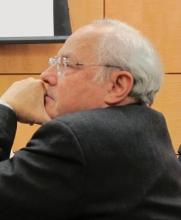WASHINGTON – The American College of Radiology’s Imaging Network and the Eastern Cooperative Oncology Group have announced that they will merge their cancer trial and research programs. And it appears that another group, the Gynecologic Oncology Group, also may be considering an alliance.
The merger between the ACR Imaging Network (ACRIN) and the Eastern Cooperative Oncology Group (ECOG), announced on March 18, is the latest in a series of alliances prompted by the National Cancer Institute’s plan to consolidate its Clinical Trials Cooperative Groups from 10 to 5, plus 1 pediatric group.
The American College of Surgeons Oncology Group, the Cancer and Leukemia Group B, and the North Central Cancer Treatment Group have announced merger plans.
And the Radiation Therapy Oncology Group and the National Surgical Adjuvant Breast and Bowel Project are joining forces in what they are calling "a collaborative alliance."
The mergers were discussed March 22 during "Implementing a National Cancer Clinical Trials System for the 21st Century," a workshop hosted by the National Cancer Policy Forum and the American Society of Clinical Oncology at the National Academy of Sciences.
The National Cancer Institute is acting in response to a report issued by the Institute of Medicine in early 2010 that recommended an overhaul of the cooperative group system. The IOM panel agreed with the NCI that it had become too unwieldy and bureaucratic. Trials were taking longer to complete, if they were being completed at all.
In a statement announcing their merger, ACRIN and ECOG said the new group would focus on three main areas: early detection and diagnosis; biomarker-driven phase II and phase III therapeutic studies; and "genetic, molecular, and imaging marker research to predict and monitor treatment response."
ECOG was one of the first cooperative groups in the NCI system. Now, it is one of the largest cancer research organizations in the United States, according to the group. ACRIN has a network of investigators from 100 academic and community-based facilities in the United States and overseas.
At the meeting, ECOG chair Dr. Robert L. Comis said that all of the groups had been trying to find ways to become stronger and "more responsive to the emerging science."
"We’re all competing for the same degenerating pot of money," said Dr. Comis, who is also president and chairman of the Coalition of Cancer Cooperative Groups, and director of the Drexel University Clinical Trials Research Center, Philadelphia.
That pressure is driving some of the consolidation, and all the mergers are making some of those who have not been asked to join a little nervous. Dr. Philip J. DiSaia, chairman of the Gynecologic Oncology Group, said at the meeting that the GOG members felt somewhat strongly that they were unique, and might not fit with any of the other groups.
He mentioned that he had been in discussions with Dr. Norman Wolmark, chairman of the National Surgical Adjuvant Breast and Bowel Project, about a possible alliance, but that nothing had come of it yet.
Dr. Wolmark spoke up at the meeting and said that he was willing to state his commitment before the assembled audience and the "several dozens" viewing the meeting by webcast. "I ask, will you marry me?" said Dr. Wolmark, who is director of oncology at the West Penn Allegheny Health System in the Pittsburgh area. He then quickly added that, "full disclosure, it will be a threesome."
"I think open marriage could work," said Dr. DiSaia, a professor of obstetrics and gynecology at the University of California, Irvine.
The NCI and the cooperative groups are continuing to mull over how the new trial system will look. The expectation is that there will be a different system by 2014.


